人教新目标(Go for it)版七年级下册Unit 12 What did you do last weekend? Section B 2a-2c课件(共49张PPT)
文档属性
| 名称 | 人教新目标(Go for it)版七年级下册Unit 12 What did you do last weekend? Section B 2a-2c课件(共49张PPT) | 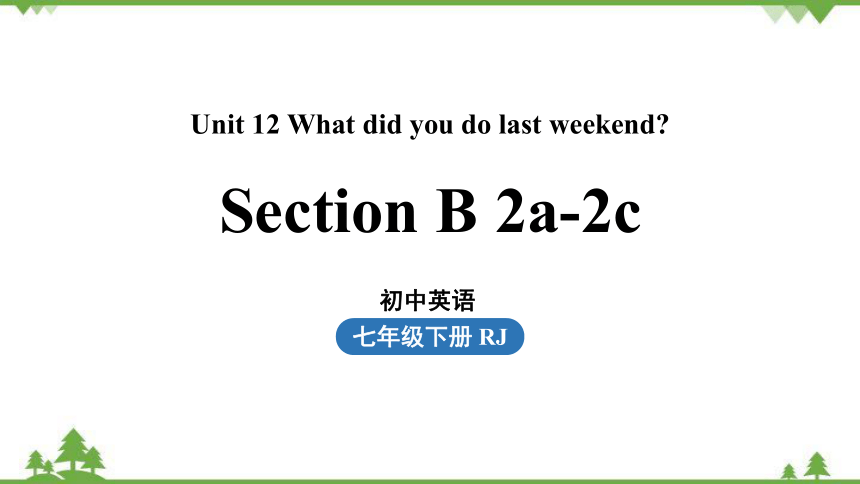 | |
| 格式 | pptx | ||
| 文件大小 | 4.6MB | ||
| 资源类型 | 教案 | ||
| 版本资源 | 人教新目标(Go for it)版 | ||
| 科目 | 英语 | ||
| 更新时间 | 2022-11-04 15:10:40 | ||
图片预览

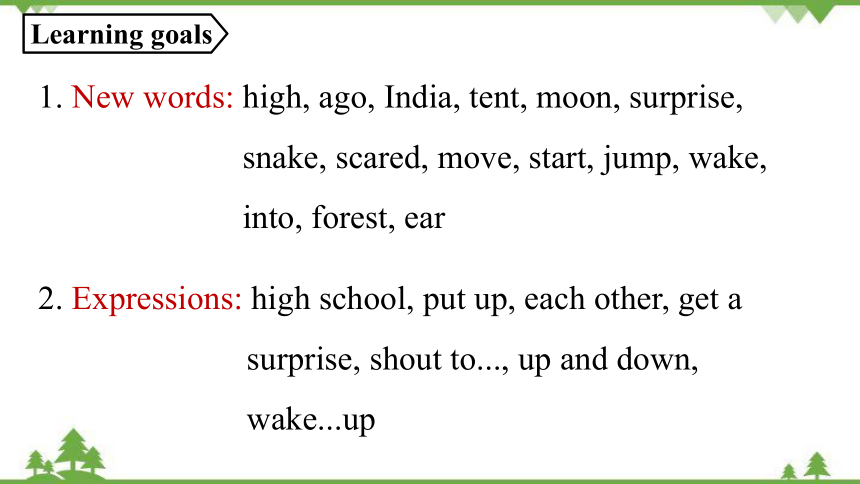
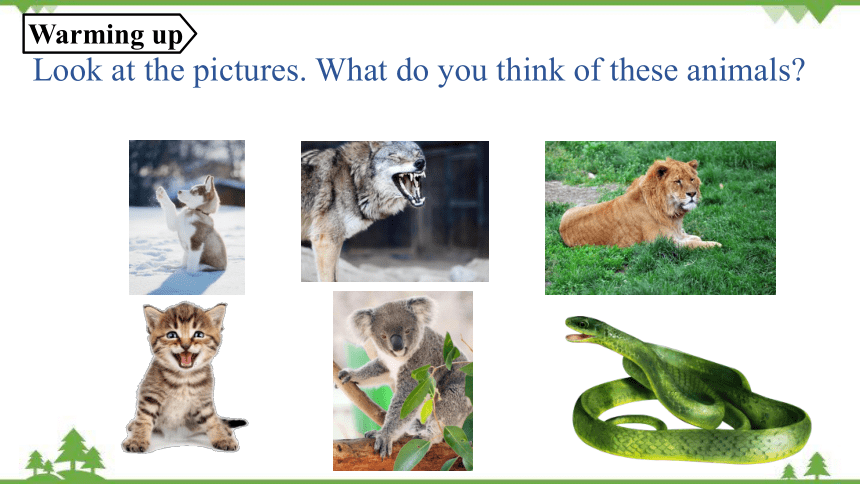
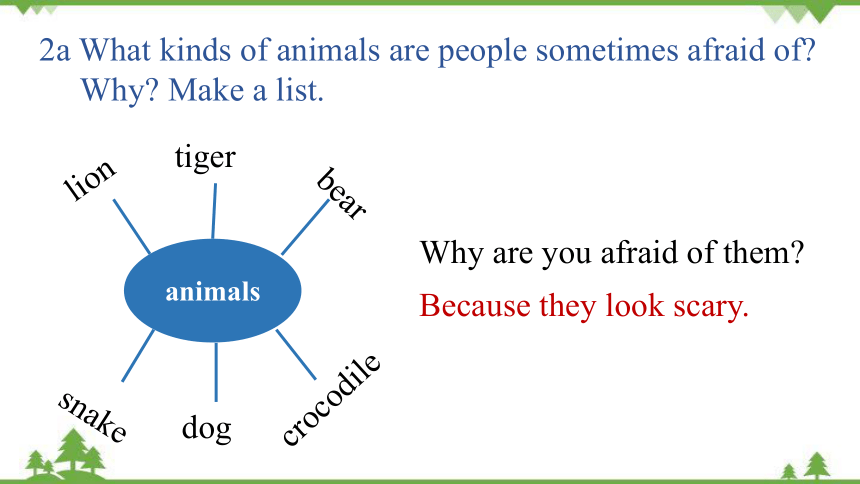
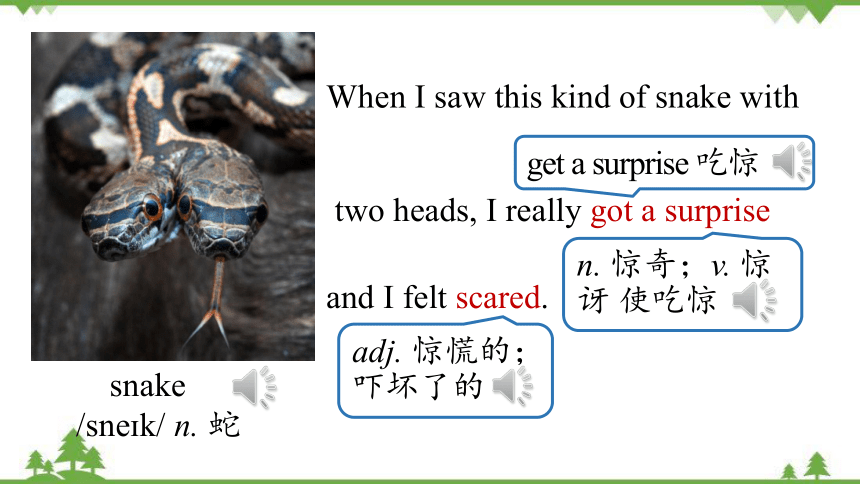
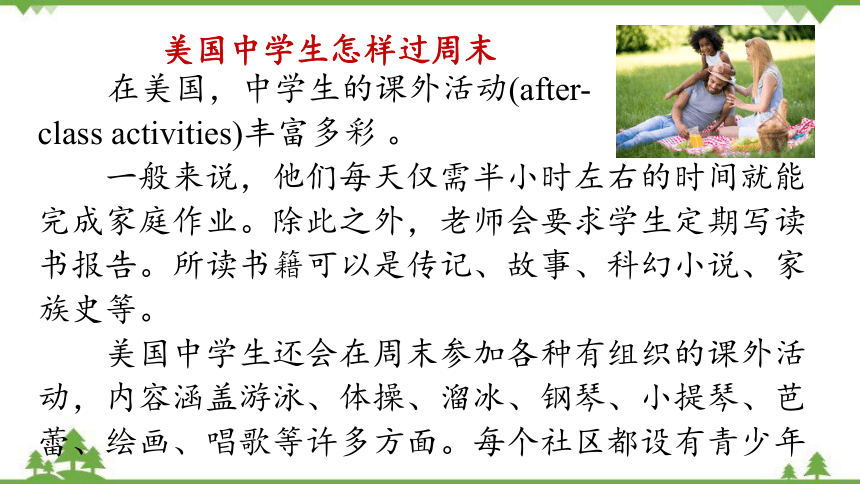
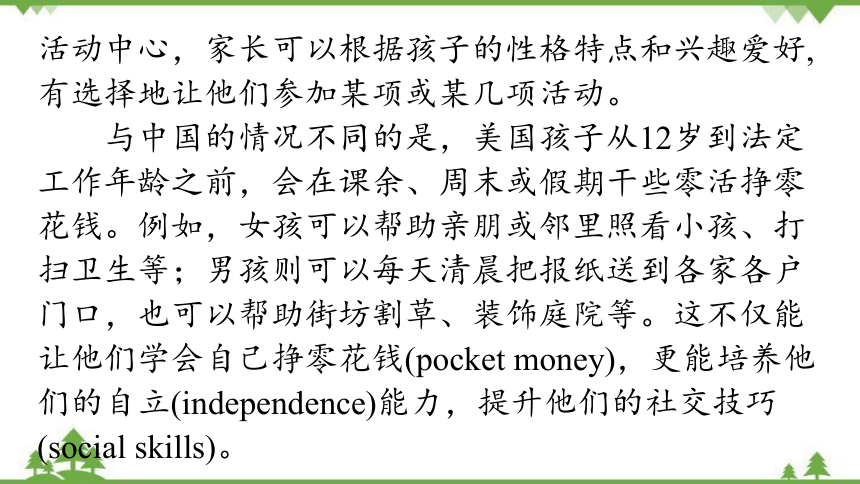
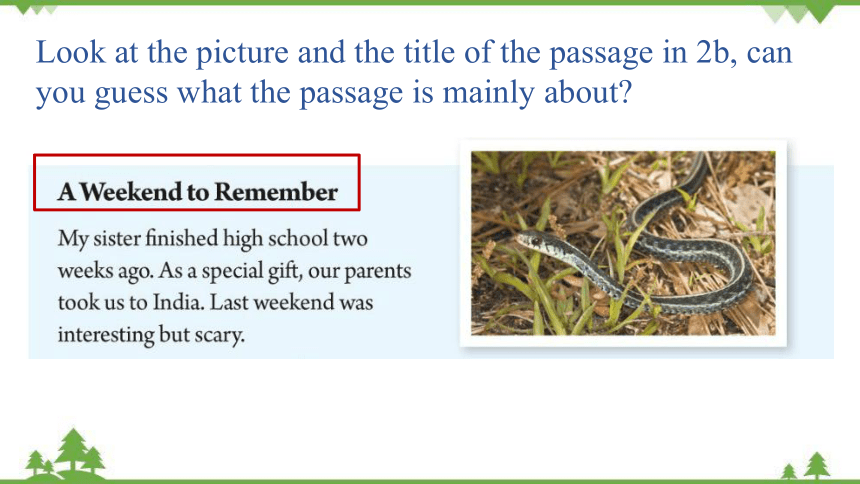
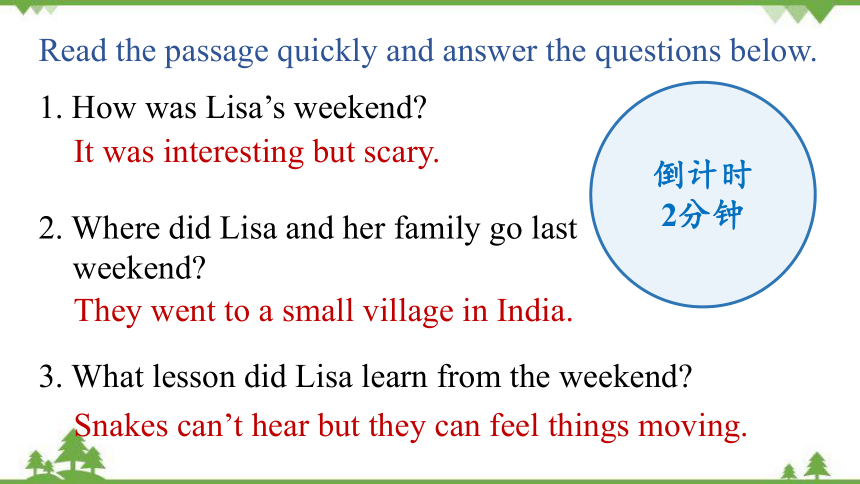
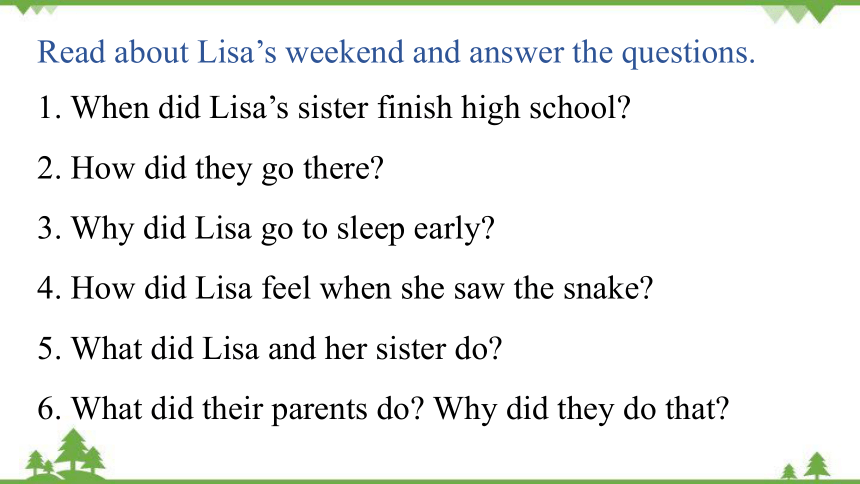
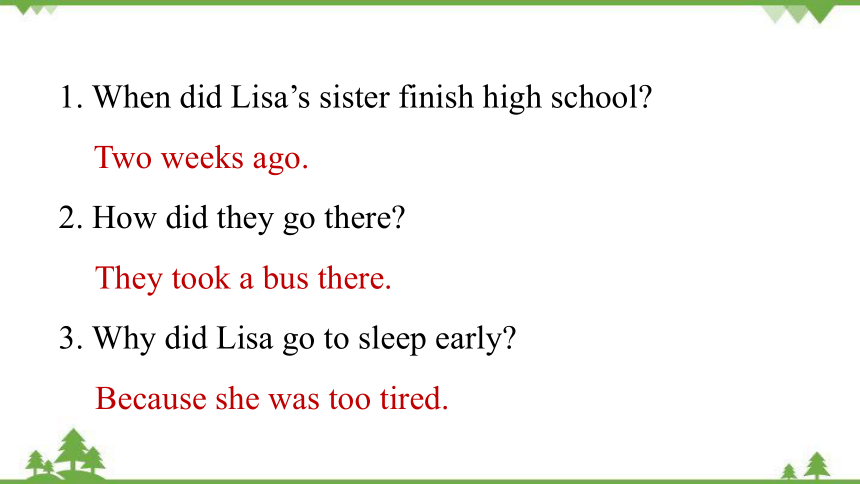
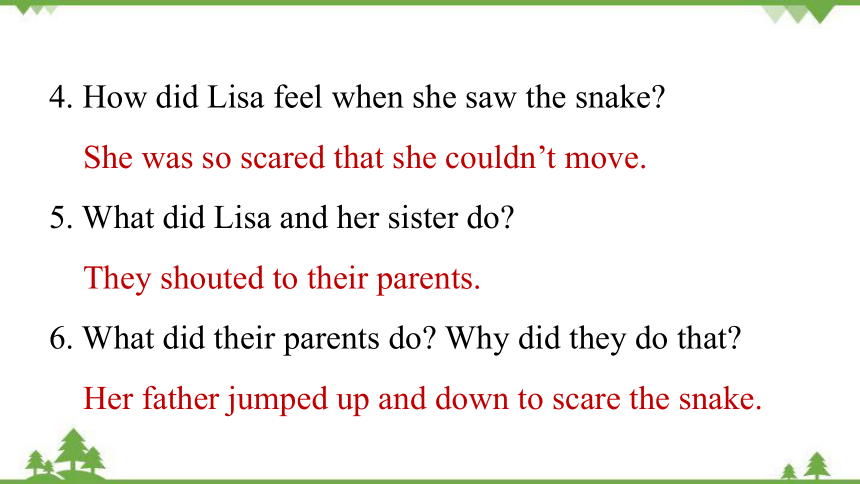
文档简介
(共49张PPT)
Section B 2a-2c
Unit 12 What did you do last weekend
初中英语
七年级下册 RJ
1. New words: high, ago, India, tent, moon, surprise, snake, scared, move, start, jump, wake, into, forest, ear
2. Expressions: high school, put up, each other, get a surprise, shout to..., up and down, wake...up
Learning goals
Look at the pictures. What do you think of these animals
Warming up
animals
snake
lion
dog
crocodile
bear
tiger
Why are you afraid of them
Because they look scary.
2a What kinds of animals are people sometimes afraid of Why Make a list.
snake
/sne k/ n. 蛇
When I saw this kind of snake with
two heads, I really got a surprise
and I felt scared.
n. 惊奇;v. 惊讶 使吃惊
get a surprise 吃惊
adj. 惊慌的;吓坏了的
在美国,中学生的课外活动(after-
class activities)丰富多彩 。
一般来说,他们每天仅需半小时左右的时间就能完成家庭作业。除此之外,老师会要求学生定期写读书报告。所读书籍可以是传记、故事、科幻小说、家族史等。
美国中学生还会在周末参加各种有组织的课外活动,内容涵盖游泳、体操、溜冰、钢琴、小提琴、芭蕾、绘画、唱歌等许多方面。每个社区都设有青少年
美国中学生怎样过周末
活动中心,家长可以根据孩子的性格特点和兴趣爱好,有选择地让他们参加某项或某几项活动。
与中国的情况不同的是,美国孩子从12岁到法定工作年龄之前,会在课余、周末或假期干些零活挣零花钱。例如,女孩可以帮助亲朋或邻里照看小孩、打扫卫生等;男孩则可以每天清晨把报纸送到各家各户门口,也可以帮助街坊割草、装饰庭院等。这不仅能让他们学会自己挣零花钱(pocket money),更能培养他们的自立(independence)能力,提升他们的社交技巧(social skills)。
Look at the picture and the title of the passage in 2b, can you guess what the passage is mainly about
Read the passage quickly and answer the questions below.
1. How was Lisa’s weekend
2. Where did Lisa and her family go last weekend
It was interesting but scary.
They went to a small village in India.
Snakes can’t hear but they can feel things moving.
倒计时
2分钟
3. What lesson did Lisa learn from the weekend
Read about Lisa’s weekend and answer the questions.
1. When did Lisa’s sister finish high school
2. How did they go there
3. Why did Lisa go to sleep early
4. How did Lisa feel when she saw the snake
5. What did Lisa and her sister do
6. What did their parents do Why did they do that
1. When did Lisa’s sister finish high school
Two weeks ago.
2. How did they go there
They took a bus there.
3. Why did Lisa go to sleep early
Because she was too tired.
4. How did Lisa feel when she saw the snake
She was so scared that she couldn’t move.
5. What did Lisa and her sister do
They shouted to their parents.
6. What did their parents do Why did they do that
Her father jumped up and down to scare the snake.
Listen and read.
A Weekend to Remember
My sister finished high school two weeks ago. As a special gift, our parents took us to India. Last weekend was interesting but scary.
We went camping in a small village in India. First, we took a long bus ride to a lake in the countryside. There we
adj.& adv. 高的(地)
adv. 以前
n. 印度
put up our tents and made a fire to keep us warm and cook food on. On the first night, we just sat under the moon and told each other stories. But I was so tired that I went to sleep early.
搭起;举起
n. 帐篷
生火
互相;彼此
n. 月亮
The next morning, my sister and I got a terrible surprise. When we looked out of our tent, we saw a big snake sleeping near the fire. I was so scared that I couldn’t move. We shouted to our parents to let them know about the danger. My dad started to jump up and down in their
tent.
v. 移动
对……大声喊叫
v. 开始;着手
v. 跳;跃
上上下下;起伏
get a surprise 吃惊
往外看
This woke the snake up and it moved into the forest near the lake. My dad told me later that snakes don’t have ears but can feel things moving. He also told me it was important not to go near a snake. This was a very useful lesson for me.
v. (woke/w k/ ) 弄醒;醒
prep. 到……里面;进入
n. 森林
n. 耳朵
时间: last weekend
地点: India
人物: my parents, my sister and I
原因: my sister finished high school; as a special gift
总结: Last weekend was interesting but scary. (引出下文)
交代背景
Para.1
详述经历
Paras.2-3
took a long bus ride→put up our tents, made a fire
the first night: sat under the moon, told each other stories
the next morning: got a surprise, saw a big snake sleeping, so scared, shouted to parents, Dad jumped up and down, the snake moved into the forest
it was important not to go near a snake
_____ snake went into the forest
_____ put up our tents and cooked food
_____ learned a useful lesson
_____ saw a snake and shouted to parents for help
_____ snakes can’t hear but can feel things moving
_____ my dad jumped up and down in his tent
_____ took a bus to a small village in India
_____ told stories under the moon, then went to sleep
Put the phrases in order according to the passage.
Then use them to retell the story.
1
6
2
8
4
7
5
3
Read the passage in 2b again and fill in the blanks.
Lisa’s family went to a small village in India to spend the weekend last week. There they _____ up tents and _____ a fire. On the first night, they _____ under the moon and _____ each other stories. The next morning, Lisa and her sister got a terrible _______. They saw a big snake. Lisa was so ______ that she couldn’t move. Then her father
_______ up and down in the tents. This woke the snake up and it ______ into the forest near the lake.
put
made
sat
told
surprise
scared
jumped
moved
Work in groups of four. One is a reporter, the other three are Lisa, Lisa’s sister and her father. Make an interview about Lisa’s weekend in India.
These sentences may help you
Hello, Lisa. Where did you go last weekend
How was your trip
Who did you go with
How did you go there
What did you do there
...
1. My sister finished high school two weeks ago. 我姐姐两周前中学毕业了。(教材P71 2b)
(1) high作形容词,意为“高的” ,强调物体高出地面的空间高度。
The building is high. 这栋建筑很高。
Language points
high /ha / adj.& adv. 高的(地)
(2) high作副词,意为“高地”。既可表示物理上的高,也可表示价格、价值、评价等抽象意义上的高。
He can jump very high. 他能跳很高。
You should aim high. 你应该志向远大。
ago / ɡ / adv. 以前
ago作副词,不能单独使用,常用于“一段时间 + ago”结构,常与一般过去时连用。
He started to play the piano three years ago. 他三年前开始弹钢琴。
1. My sister finished high school two weeks ago. 我姐姐两周前中学毕业了。(教材P71 2b)
2. There we put up our tents and made a fire to keep us warm and cook food on. 在那里我们搭起帐篷,生火取暖并做饭。(教材P71 2b)
【句式剖析】①本句中 put up和made 作并列谓语,表示动作连续发生;
②本句中 to keep us warm and cook food on 为动词不定式短语作目的状语,表示 made a fire的目的。
put up 搭起;举起
put up 在此意为“搭起”,是“动词 + 副词”型短语。其宾语为名词时,名词放在up之前或之后均可;宾语为代词时,代词要放在 put与up 之间。
It’s going to rain. Let’s put up the tent. 要下雨了。咱们把帐篷搭起来吧。
Here is the tent. Let’s put it up. 帐篷在这儿。咱们把它搭起来吧。
【拓展】put up的其他常见含义:
put up
举起
张贴
He puts up his hand to ask a question. 他举起手来问问题。
They put up a notice on the wall. 他们在墙上贴了一张布告。
【图解助记】put up 的一词多义:
搭起 举起 张贴
3. But I was so tired that I went to sleep early. 但是我太累了,所以早早就睡了。(教材P71 2b)
so ... that ... 意为“如此…… 以至于……”,是固定结构,so 后接形容词或副词,that 后的句子表示结果。
Jim is so busy that he has little time for his family. 吉姆太忙了,以至于他几乎没有时间陪他的家人。
so... that... 结构
【拓展】so... that ... 后的从句为肯定句时,该结构可与 ...enough to... 互相转化;其后的从句为否定句时,它可以与 too... to... 互相转化。
The boy got up so early that he caught the early bus. = The boy got up early enough to catch the early bus. 这个男孩起得很早,以至于他赶上了早班车。
He is so young that he can’t go to school. =He is too young to go to school.
他那么小,以至于不能去上学。
4. The next morning, my sister and I got a terrible surprise. 第二天早上,我和姐姐大吃一惊。 (教材P71 2b)
(1) surprise 在此处作可数名词,意为“惊奇,惊讶”。表示抽象事物时,用作不可数名词;表示具体事物时,用作可数名词。
surprise /s (r) pra z/ n. 惊奇;惊讶 v. 使吃惊
surprise
get a surprise 吃惊
give sb. a surprise 给某人一个惊喜
in surprise 惊奇地,惊讶地
to one’s surprise 让某人惊讶的是
常用短语:
I got a surprise when I saw the bill. 一看账单我吃了一惊。
They looked at each other in surprise. 他们惊讶地看着对方。
To my surprise, he didn’t pass the exam. 让我惊讶的是,他没有通过考试。
(2) surprise也可作及物动词,意为“使吃惊”。
The news surprised me a lot. 这消息使我非常惊讶。
(3)surprise的形容词有两个:surprised感到惊讶的(常用来修饰人),surprising令人惊奇的(常用来修饰物)。
5. When we looked out of our tent, we saw a big snake sleeping near the fire. 我们向帐篷外看时,看到了一条大蛇正在篝火旁睡觉。(教材P71 2b)
look out of 后接名词或代词,其反义短语为 look into。
The boy is looking out of the window. 这个男孩正在向窗外看。
【拓展】look out意为“当心”,相当于 be careful。
Look out! Here comes a car. 当心!过来一辆小汽车。
look out of 向……外看
see sb./sth. doing sth. 意为“看见某人/某物正在做某事”,强调看到动作正在发生;而 see sb./sth. do sth. 意为“看到某人/某物做了某事”,强调看见动作发生的全过程,或者看到动作经常发生。
I saw him playing basketball at nine o’clock in the morning. 上午9点钟,我看到他正在打篮球。
I often see her read in the library. 我经常看到她在图书馆看书。
see sb./sth. doing sth. 看见某人/某物正在做某事
5. When we looked out of our tent, we saw a big snake sleeping near the fire. 我们向帐篷外看时,看到了一条大蛇正在篝火旁睡觉。(教材P71 2b)
6. I was so scared that I couldn’t move. 我是那么害怕,一动都不敢动.(教材P71 2b)
scared作形容词,通常用来表示人的感受,常用结构有:
be scared of sth. /doing sth.害怕某物/做某事
be scared to do sth.害怕做某事
My cousin isn’t scared of snakes. 我堂姐不害怕蛇。
She is scared to climb the tree. 她害怕爬树。
scared /ske d/,/skerd/ adj. 惊慌的;吓坏了的
【拓展】scary作形容词,意为“吓人的;恐怖的”,常用来表示物的特征。
The movie is scary. Can you watch it with me 这部电影很恐怖。你能和我一起看吗?
move /mu v/ v. 移动
move在句中作不及物动词,意为“移动”。move 作不及物动词时,还可意为“搬家,搬迁”,“move to + 地点名词”表示“搬到……”
Don’t move, or you’ll be in danger. 不要动,否则你会有危险。
We’ll move to the countryside next month. 我们下个月将搬到乡下。
6. I was so scared that I couldn’t move. 我是那么害怕,一动都不敢动.(教材P71 2b)
【拓展】move 也可作及物动词,意为“使移动”,还可表示“使感动,打动”。
He moved his chair nearer the old man. 他把椅子移得离这个老人更近了一些。
His speech moved me to tears. 他的演讲让我感动得流泪。
7. This woke the snake up and it moved into the forest near the lake. 这一举动惊醒了蛇,它爬进了湖边的树林里。(教材P71 2b)
wake...up 中的wake作动词,意为“弄醒,醒”;up为副词。该短语为“动词 + 副词”型短语,当宾语是名词时,名词可以放在wake和up之间,也可以放在up的后面;当宾语是代词时,代词必须放在wake和up之间。
wake...up 把……弄醒
Wake up your brother. It’s time for breakfast. 把你弟弟叫醒。该吃早饭了。
I’ll wake you up for the medicine. 我会叫醒你吃药的。
【拓展】 wake up 还可作不及物动词短语,意为“醒,醒来”。
My grandma usually wakes up early. 我奶奶通常醒得早。
1.To his s_________, his father agreed with him to watch TV.
2.Tigers and monkeys like to live in the f_________.
3.There is no water or air on the m____.
4.His family m_________ to Nanjing two years ago.
5.Mom, please w_________ me up at six o’clock tomorrow morning.
6.He sent an e-mail to his friend two days_____(以前).
7.The rabbit has two______(耳朵).
一、根据汉语或首字母提示完成句子
urprise
orest
oon
ago
oved
ake
ears
Exercises
二、用所给单词的适当形式填空
1.We (move) to another city last month.
2.I saw two (snake) in the forest. I was
so (scare).
3.He (start) to write novels at the age of 20.
4.(盐城中考) About 300 to 1,300 red-crowned
cranes (fly) to Yancheng Wetland Rare Birds National Nature Reserve every year to spend the winter.
moved
snakes
scared
started
fly
三、根据汉语意思完成句子(每空一词)
1.我们坐了很长时间的公共汽车到了山里。
We to the mountains.
2.我喜欢和我的父母在公园放风筝。
I like with my parents in the park.
3.莉莉是我最好的朋友。我们经常互相帮助。
Lily is my best friend. We often help .
took a long bus ride
flying kites
each other
4.当我看到考试分数时,我吃了一惊。
I _ when I saw the grades of the exams
5.你能教我怎样搭这个帐篷吗?
Can you teach me the tent
6.我往车外一看,发现一个小孩坐在树下。
I the car and found a child sitting under the tree.
got a surprise
how to put up
looked out of
7.把你弟弟叫醒。该吃早饭了。
your brother. It’s time for breakfast.
8.当那个小男孩知道这个好消息后,他高兴地上蹿下跳。
That little boy happily when he knew the good news.
9.他看到一条蛇,大喊他的朋友们让他们知道有危险。
He saw a snake and his friends to let them know about the danger.
Wake up
jumped up and down
shouted to/at
Last winter holiday, we went to Arizona in the USA. We stayed there for three days. We walked in the hills, we _____ (go) boating and did some horse-riding. The weather _____ (be) fine. At night, we _____ (put up) tents, _____ (enjoy) delicious food and _____ (tell) stories to each other. It was a great holiday, we had a good time there.
四、根据短文内容,用所给单词的正确形式填空
1
2
4
5
3
1
2
3
4
5
_______
______
_______
_______
______
went
was
put up
enjoyed
told
Summary
Key words
high, ago, India, tent, moon, surprise, snake,scared, move, start, jump, wake, into, forest, ear
Useful expressions
high school, put up, each other, get a surprise, shout to, up and down, wake...up
2. Finish the exercises in the workbook.
1. Retell the passage in 2b.
Homework
THANKS
谢谢聆听!
Section B 2a-2c
Unit 12 What did you do last weekend
初中英语
七年级下册 RJ
1. New words: high, ago, India, tent, moon, surprise, snake, scared, move, start, jump, wake, into, forest, ear
2. Expressions: high school, put up, each other, get a surprise, shout to..., up and down, wake...up
Learning goals
Look at the pictures. What do you think of these animals
Warming up
animals
snake
lion
dog
crocodile
bear
tiger
Why are you afraid of them
Because they look scary.
2a What kinds of animals are people sometimes afraid of Why Make a list.
snake
/sne k/ n. 蛇
When I saw this kind of snake with
two heads, I really got a surprise
and I felt scared.
n. 惊奇;v. 惊讶 使吃惊
get a surprise 吃惊
adj. 惊慌的;吓坏了的
在美国,中学生的课外活动(after-
class activities)丰富多彩 。
一般来说,他们每天仅需半小时左右的时间就能完成家庭作业。除此之外,老师会要求学生定期写读书报告。所读书籍可以是传记、故事、科幻小说、家族史等。
美国中学生还会在周末参加各种有组织的课外活动,内容涵盖游泳、体操、溜冰、钢琴、小提琴、芭蕾、绘画、唱歌等许多方面。每个社区都设有青少年
美国中学生怎样过周末
活动中心,家长可以根据孩子的性格特点和兴趣爱好,有选择地让他们参加某项或某几项活动。
与中国的情况不同的是,美国孩子从12岁到法定工作年龄之前,会在课余、周末或假期干些零活挣零花钱。例如,女孩可以帮助亲朋或邻里照看小孩、打扫卫生等;男孩则可以每天清晨把报纸送到各家各户门口,也可以帮助街坊割草、装饰庭院等。这不仅能让他们学会自己挣零花钱(pocket money),更能培养他们的自立(independence)能力,提升他们的社交技巧(social skills)。
Look at the picture and the title of the passage in 2b, can you guess what the passage is mainly about
Read the passage quickly and answer the questions below.
1. How was Lisa’s weekend
2. Where did Lisa and her family go last weekend
It was interesting but scary.
They went to a small village in India.
Snakes can’t hear but they can feel things moving.
倒计时
2分钟
3. What lesson did Lisa learn from the weekend
Read about Lisa’s weekend and answer the questions.
1. When did Lisa’s sister finish high school
2. How did they go there
3. Why did Lisa go to sleep early
4. How did Lisa feel when she saw the snake
5. What did Lisa and her sister do
6. What did their parents do Why did they do that
1. When did Lisa’s sister finish high school
Two weeks ago.
2. How did they go there
They took a bus there.
3. Why did Lisa go to sleep early
Because she was too tired.
4. How did Lisa feel when she saw the snake
She was so scared that she couldn’t move.
5. What did Lisa and her sister do
They shouted to their parents.
6. What did their parents do Why did they do that
Her father jumped up and down to scare the snake.
Listen and read.
A Weekend to Remember
My sister finished high school two weeks ago. As a special gift, our parents took us to India. Last weekend was interesting but scary.
We went camping in a small village in India. First, we took a long bus ride to a lake in the countryside. There we
adj.& adv. 高的(地)
adv. 以前
n. 印度
put up our tents and made a fire to keep us warm and cook food on. On the first night, we just sat under the moon and told each other stories. But I was so tired that I went to sleep early.
搭起;举起
n. 帐篷
生火
互相;彼此
n. 月亮
The next morning, my sister and I got a terrible surprise. When we looked out of our tent, we saw a big snake sleeping near the fire. I was so scared that I couldn’t move. We shouted to our parents to let them know about the danger. My dad started to jump up and down in their
tent.
v. 移动
对……大声喊叫
v. 开始;着手
v. 跳;跃
上上下下;起伏
get a surprise 吃惊
往外看
This woke the snake up and it moved into the forest near the lake. My dad told me later that snakes don’t have ears but can feel things moving. He also told me it was important not to go near a snake. This was a very useful lesson for me.
v. (woke/w k/ ) 弄醒;醒
prep. 到……里面;进入
n. 森林
n. 耳朵
时间: last weekend
地点: India
人物: my parents, my sister and I
原因: my sister finished high school; as a special gift
总结: Last weekend was interesting but scary. (引出下文)
交代背景
Para.1
详述经历
Paras.2-3
took a long bus ride→put up our tents, made a fire
the first night: sat under the moon, told each other stories
the next morning: got a surprise, saw a big snake sleeping, so scared, shouted to parents, Dad jumped up and down, the snake moved into the forest
it was important not to go near a snake
_____ snake went into the forest
_____ put up our tents and cooked food
_____ learned a useful lesson
_____ saw a snake and shouted to parents for help
_____ snakes can’t hear but can feel things moving
_____ my dad jumped up and down in his tent
_____ took a bus to a small village in India
_____ told stories under the moon, then went to sleep
Put the phrases in order according to the passage.
Then use them to retell the story.
1
6
2
8
4
7
5
3
Read the passage in 2b again and fill in the blanks.
Lisa’s family went to a small village in India to spend the weekend last week. There they _____ up tents and _____ a fire. On the first night, they _____ under the moon and _____ each other stories. The next morning, Lisa and her sister got a terrible _______. They saw a big snake. Lisa was so ______ that she couldn’t move. Then her father
_______ up and down in the tents. This woke the snake up and it ______ into the forest near the lake.
put
made
sat
told
surprise
scared
jumped
moved
Work in groups of four. One is a reporter, the other three are Lisa, Lisa’s sister and her father. Make an interview about Lisa’s weekend in India.
These sentences may help you
Hello, Lisa. Where did you go last weekend
How was your trip
Who did you go with
How did you go there
What did you do there
...
1. My sister finished high school two weeks ago. 我姐姐两周前中学毕业了。(教材P71 2b)
(1) high作形容词,意为“高的” ,强调物体高出地面的空间高度。
The building is high. 这栋建筑很高。
Language points
high /ha / adj.& adv. 高的(地)
(2) high作副词,意为“高地”。既可表示物理上的高,也可表示价格、价值、评价等抽象意义上的高。
He can jump very high. 他能跳很高。
You should aim high. 你应该志向远大。
ago / ɡ / adv. 以前
ago作副词,不能单独使用,常用于“一段时间 + ago”结构,常与一般过去时连用。
He started to play the piano three years ago. 他三年前开始弹钢琴。
1. My sister finished high school two weeks ago. 我姐姐两周前中学毕业了。(教材P71 2b)
2. There we put up our tents and made a fire to keep us warm and cook food on. 在那里我们搭起帐篷,生火取暖并做饭。(教材P71 2b)
【句式剖析】①本句中 put up和made 作并列谓语,表示动作连续发生;
②本句中 to keep us warm and cook food on 为动词不定式短语作目的状语,表示 made a fire的目的。
put up 搭起;举起
put up 在此意为“搭起”,是“动词 + 副词”型短语。其宾语为名词时,名词放在up之前或之后均可;宾语为代词时,代词要放在 put与up 之间。
It’s going to rain. Let’s put up the tent. 要下雨了。咱们把帐篷搭起来吧。
Here is the tent. Let’s put it up. 帐篷在这儿。咱们把它搭起来吧。
【拓展】put up的其他常见含义:
put up
举起
张贴
He puts up his hand to ask a question. 他举起手来问问题。
They put up a notice on the wall. 他们在墙上贴了一张布告。
【图解助记】put up 的一词多义:
搭起 举起 张贴
3. But I was so tired that I went to sleep early. 但是我太累了,所以早早就睡了。(教材P71 2b)
so ... that ... 意为“如此…… 以至于……”,是固定结构,so 后接形容词或副词,that 后的句子表示结果。
Jim is so busy that he has little time for his family. 吉姆太忙了,以至于他几乎没有时间陪他的家人。
so... that... 结构
【拓展】so... that ... 后的从句为肯定句时,该结构可与 ...enough to... 互相转化;其后的从句为否定句时,它可以与 too... to... 互相转化。
The boy got up so early that he caught the early bus. = The boy got up early enough to catch the early bus. 这个男孩起得很早,以至于他赶上了早班车。
He is so young that he can’t go to school. =He is too young to go to school.
他那么小,以至于不能去上学。
4. The next morning, my sister and I got a terrible surprise. 第二天早上,我和姐姐大吃一惊。 (教材P71 2b)
(1) surprise 在此处作可数名词,意为“惊奇,惊讶”。表示抽象事物时,用作不可数名词;表示具体事物时,用作可数名词。
surprise /s (r) pra z/ n. 惊奇;惊讶 v. 使吃惊
surprise
get a surprise 吃惊
give sb. a surprise 给某人一个惊喜
in surprise 惊奇地,惊讶地
to one’s surprise 让某人惊讶的是
常用短语:
I got a surprise when I saw the bill. 一看账单我吃了一惊。
They looked at each other in surprise. 他们惊讶地看着对方。
To my surprise, he didn’t pass the exam. 让我惊讶的是,他没有通过考试。
(2) surprise也可作及物动词,意为“使吃惊”。
The news surprised me a lot. 这消息使我非常惊讶。
(3)surprise的形容词有两个:surprised感到惊讶的(常用来修饰人),surprising令人惊奇的(常用来修饰物)。
5. When we looked out of our tent, we saw a big snake sleeping near the fire. 我们向帐篷外看时,看到了一条大蛇正在篝火旁睡觉。(教材P71 2b)
look out of 后接名词或代词,其反义短语为 look into。
The boy is looking out of the window. 这个男孩正在向窗外看。
【拓展】look out意为“当心”,相当于 be careful。
Look out! Here comes a car. 当心!过来一辆小汽车。
look out of 向……外看
see sb./sth. doing sth. 意为“看见某人/某物正在做某事”,强调看到动作正在发生;而 see sb./sth. do sth. 意为“看到某人/某物做了某事”,强调看见动作发生的全过程,或者看到动作经常发生。
I saw him playing basketball at nine o’clock in the morning. 上午9点钟,我看到他正在打篮球。
I often see her read in the library. 我经常看到她在图书馆看书。
see sb./sth. doing sth. 看见某人/某物正在做某事
5. When we looked out of our tent, we saw a big snake sleeping near the fire. 我们向帐篷外看时,看到了一条大蛇正在篝火旁睡觉。(教材P71 2b)
6. I was so scared that I couldn’t move. 我是那么害怕,一动都不敢动.(教材P71 2b)
scared作形容词,通常用来表示人的感受,常用结构有:
be scared of sth. /doing sth.害怕某物/做某事
be scared to do sth.害怕做某事
My cousin isn’t scared of snakes. 我堂姐不害怕蛇。
She is scared to climb the tree. 她害怕爬树。
scared /ske d/,/skerd/ adj. 惊慌的;吓坏了的
【拓展】scary作形容词,意为“吓人的;恐怖的”,常用来表示物的特征。
The movie is scary. Can you watch it with me 这部电影很恐怖。你能和我一起看吗?
move /mu v/ v. 移动
move在句中作不及物动词,意为“移动”。move 作不及物动词时,还可意为“搬家,搬迁”,“move to + 地点名词”表示“搬到……”
Don’t move, or you’ll be in danger. 不要动,否则你会有危险。
We’ll move to the countryside next month. 我们下个月将搬到乡下。
6. I was so scared that I couldn’t move. 我是那么害怕,一动都不敢动.(教材P71 2b)
【拓展】move 也可作及物动词,意为“使移动”,还可表示“使感动,打动”。
He moved his chair nearer the old man. 他把椅子移得离这个老人更近了一些。
His speech moved me to tears. 他的演讲让我感动得流泪。
7. This woke the snake up and it moved into the forest near the lake. 这一举动惊醒了蛇,它爬进了湖边的树林里。(教材P71 2b)
wake...up 中的wake作动词,意为“弄醒,醒”;up为副词。该短语为“动词 + 副词”型短语,当宾语是名词时,名词可以放在wake和up之间,也可以放在up的后面;当宾语是代词时,代词必须放在wake和up之间。
wake...up 把……弄醒
Wake up your brother. It’s time for breakfast. 把你弟弟叫醒。该吃早饭了。
I’ll wake you up for the medicine. 我会叫醒你吃药的。
【拓展】 wake up 还可作不及物动词短语,意为“醒,醒来”。
My grandma usually wakes up early. 我奶奶通常醒得早。
1.To his s_________, his father agreed with him to watch TV.
2.Tigers and monkeys like to live in the f_________.
3.There is no water or air on the m____.
4.His family m_________ to Nanjing two years ago.
5.Mom, please w_________ me up at six o’clock tomorrow morning.
6.He sent an e-mail to his friend two days_____(以前).
7.The rabbit has two______(耳朵).
一、根据汉语或首字母提示完成句子
urprise
orest
oon
ago
oved
ake
ears
Exercises
二、用所给单词的适当形式填空
1.We (move) to another city last month.
2.I saw two (snake) in the forest. I was
so (scare).
3.He (start) to write novels at the age of 20.
4.(盐城中考) About 300 to 1,300 red-crowned
cranes (fly) to Yancheng Wetland Rare Birds National Nature Reserve every year to spend the winter.
moved
snakes
scared
started
fly
三、根据汉语意思完成句子(每空一词)
1.我们坐了很长时间的公共汽车到了山里。
We to the mountains.
2.我喜欢和我的父母在公园放风筝。
I like with my parents in the park.
3.莉莉是我最好的朋友。我们经常互相帮助。
Lily is my best friend. We often help .
took a long bus ride
flying kites
each other
4.当我看到考试分数时,我吃了一惊。
I _ when I saw the grades of the exams
5.你能教我怎样搭这个帐篷吗?
Can you teach me the tent
6.我往车外一看,发现一个小孩坐在树下。
I the car and found a child sitting under the tree.
got a surprise
how to put up
looked out of
7.把你弟弟叫醒。该吃早饭了。
your brother. It’s time for breakfast.
8.当那个小男孩知道这个好消息后,他高兴地上蹿下跳。
That little boy happily when he knew the good news.
9.他看到一条蛇,大喊他的朋友们让他们知道有危险。
He saw a snake and his friends to let them know about the danger.
Wake up
jumped up and down
shouted to/at
Last winter holiday, we went to Arizona in the USA. We stayed there for three days. We walked in the hills, we _____ (go) boating and did some horse-riding. The weather _____ (be) fine. At night, we _____ (put up) tents, _____ (enjoy) delicious food and _____ (tell) stories to each other. It was a great holiday, we had a good time there.
四、根据短文内容,用所给单词的正确形式填空
1
2
4
5
3
1
2
3
4
5
_______
______
_______
_______
______
went
was
put up
enjoyed
told
Summary
Key words
high, ago, India, tent, moon, surprise, snake,scared, move, start, jump, wake, into, forest, ear
Useful expressions
high school, put up, each other, get a surprise, shout to, up and down, wake...up
2. Finish the exercises in the workbook.
1. Retell the passage in 2b.
Homework
THANKS
谢谢聆听!
同课章节目录
- Unit 1 Can you play the guitar?
- Section A
- Section B
- Unit 2 What time do you go to school?
- Section A
- Section B
- Unit 3 How do you get to school?
- Section A
- Section B
- Unit 4 Don't eat in class.
- Section A
- Section B
- Unit 5 Why do you like pandas?
- Section A
- Section B
- Unit 6 I'm watching TV.
- Section A
- Section B
- Review of Units 1-6
- Unit 7 It's raining!
- Section A
- Section B
- Unit 8 Is there a post office near here?
- Section A
- Section B
- Unit 9 What does he look like?
- Section A
- Section B
- Unit 10 I'd like some noodles.
- Section A
- Section B
- Unit 11 How was your school trip?
- Section A
- Section B
- Unit 12 What did you do last weekend?
- Section A
- Section B
